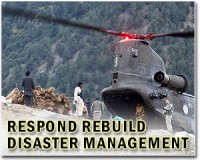 |
Port-Au-Prince (AFP) Jan 21, 2010 Her husband and two of her children died in Haiti's earthquake but Mariane Dorleis is not alone. Neighbors have shared food with her and local men have formed armed gangs for protection. Solidarity has grown out of misery in Carrefour, a chaotic seaside shantytown on the outskirts of Port-au-Prince that has received none of the international aid beginning to reach parts of the capital. Out at sea, a giant US aircraft carrier and hospital ship is anchored, while US military helicopters regularly thunder overhead -- cruel reminders of this shattered community's lack of help from the outside world. "I live day to day," said Dorleis, 42. She was doing laundry when the earthquake struck, while her husband, a fisherman, and two of her children slept inside their house. Neighbors helped her to drag the three bodies from the rubble, to bury them between two roads, to build a shelter out of cloth and logs. She used to sell the fish her husband caught and now has no means of survival, so neighbors also feed her and her two surviving young ones. "There is a gentleman who helps me. My neighbors can't help me all the time, but I would not know what to do to survive. This morning, I had nothing to give to the children," she said. The man helping her has five of his own offspring to support. His house was flattened in the quake, his fishing boat shattered, leaving him nothing but his net, which Dorleis was repairing in exchange for his help. "I make every effort possible, but we don't have much. We haven't received any aid and I have a big family to feed," said Jean-Michel Nazaire, 45. He wanted to search for aid and work but feared venturing out into the street, where there was only looting, chaos and the lingering stench of death. Antoine Nadal, a 52-year-old chauffeur, was one of the few who has left the shantytown since the massive 7.0-magnitude earthquake struck nine days ago, claiming at least 75,000 lives. It left over half a million homeless and flattened a large swath of the country. "If there had been any aid in Carrefour then I would have found it, I can tell you -- I need it," he said He went to the airport to offer his services as a driver, but everything was in turmoil there too and he came back empty-handed. "We live, we share," said Nadal. Neighbors clubbed together to share rice, maize and oil, and traveled to a nearby source for water. But today, there nothing was left to eat. "Since this morning, I haven't been able to feed my children. They are just six, ten and 11 years old," added Nadal. Like others in the ruined neighborhoods of Port-au-Prince, local men here formed groups to fight off looters. "Since the start, they have come to steal the only things we were able to save from the rubble -- sheets, curtains, even doors. We chased them off with stones and sticks," said Nazaire. At nightfall the men regrouped, lit fires and kept watch. Arriving a little later, 50-year-old Christer Desulmain asked for help to dig out victims of the quake, whose rotting bodies were giving off an unbearable smell. "We try to get organized, we try to form communities, but they also need to send us help from outside," he said. In central Port-au-Prince things are improving for survivors, but slowly. Carole Deslouis has lived for almost nine days in Champs-du-Mars square, in front of the destroyed presidential palace, washing her children with filthy water and begging for rice. On Thursday, she finally received water and the promise of shelter under an awning. "We want to stop living like animals," says Deslouis, who watched with satisfaction as streetsweepers and excavators cleared the space where her family would sleep. "Every morning when we get up we don't know what we are going to eat or if we will get any water. We are scared by the nights," added Michel-Ange Piquant, who is living with his family of six under a blue plastic sheet. A joint Franco-American plan starting Thursday will provide baths, food, water and tents for 5,000 refugees living in this square. Champs-du-Mars "is a symbol of the life of this country, where everybody came on the night of the earthquake... We have to give some dignity back to this plaza," said Didier Le Bret, the French ambassador in Port-au-Prince.
Share This Article With Planet Earth
Related Links Bringing Order To A World Of Disasters A world of storm and tempest When the Earth Quakes
 Haitians rush for cash as bank re-opens
Haitians rush for cash as bank re-opensPort-Au-Prince (AFP) Jan 21, 2010 Hundreds of Haitians rushed Thursday to make deposits and withdraw cash as a main bank re-opened almost nine days after a massive earthquake left the capital city in ruins. Under extremely tight security, including individual screenings of customers and their documents, and a shut down of the surrounding street, patrons of the Central Bank of Haiti (BRH) stood in single file to await a visit ... read more |
|
| The content herein, unless otherwise known to be public domain, are Copyright 1995-2009 - SpaceDaily. AFP and UPI Wire Stories are copyright Agence France-Presse and United Press International. ESA Portal Reports are copyright European Space Agency. All NASA sourced material is public domain. Additional copyrights may apply in whole or part to other bona fide parties. Advertising does not imply endorsement,agreement or approval of any opinions, statements or information provided by SpaceDaily on any Web page published or hosted by SpaceDaily. Privacy Statement |